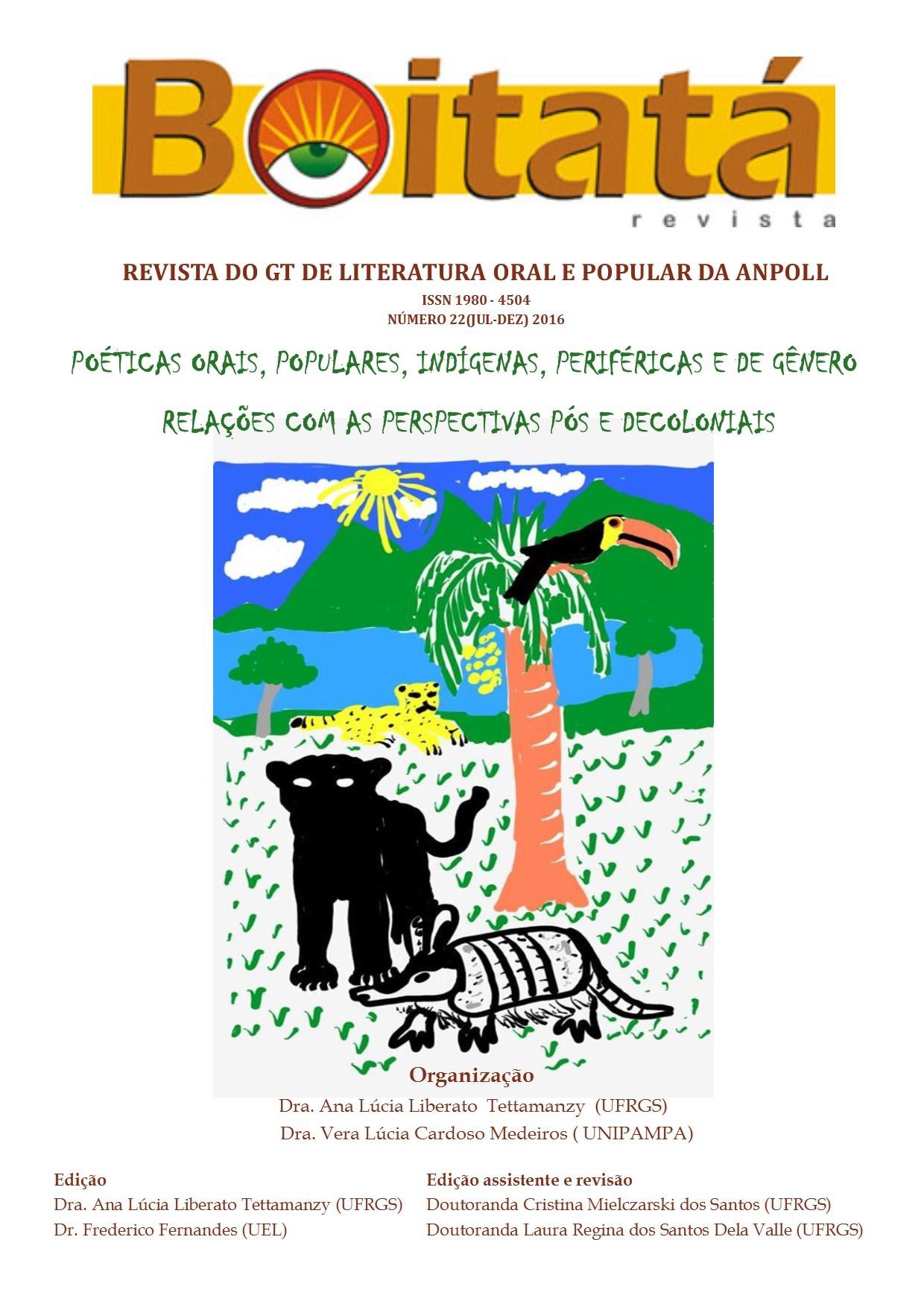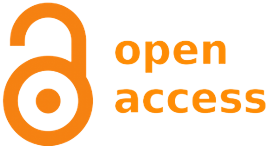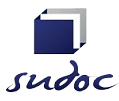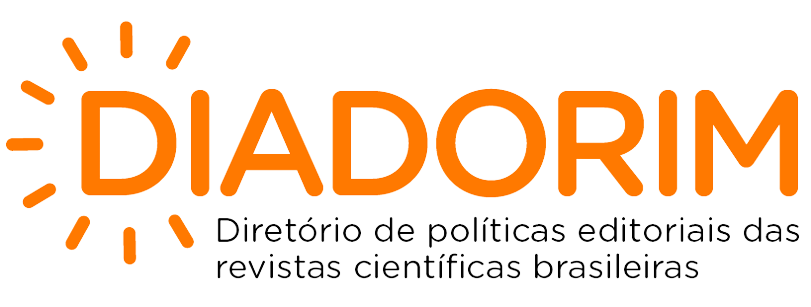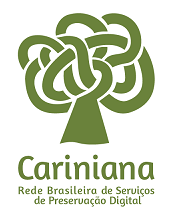Shared readings by three authors of the indigenous literature: an experience on alterities and the decolonization of curriculum
DOI:
https://doi.org/10.5433/boitata.2016v11.e31284Keywords:
Reading, Indígena Literature, Decolonization, Curriculum.Abstract
This article reports a shared reading experience involving the educators in the city of São Paulo. The pedagogical practice aimed to deepen the discussions about the importance of the school as a space for the formation of readers, the decolonization of the curriculum and the understanding of the indigenous alterities. The project took place during the Indigenous August and investigated the possibilities of decolonization of the curriculum from the children's and youth literature by three exponents of the indigenous culture: Daniel Mundukuru, Kaká Werá Jecupé and Yaguarê Yamã. The shared works deal with themes of ancestry and cosmogony, providing the observation of their reception by readers and listeners. The result of the experience culminated in the deepening of the discussions on ethical and aesthetic issues that contemplate respect for the indigenous culture and the unveiling of new knowledge not yet contemplated by the school curriculum, based on an ecological perspective (SANTOS), cosmic (MORIN) and dialectic (FREIRE).Downloads
Download data is not yet available.
References
BRASIL. Lei 11.645, de 10 de março de 2008.
Altera a Lei no 9.394, de 20 de dezembro de 1996, modificada pela Lei no 10.639, de 9 de janeiro de 2003. Disponível em: http://www.planalto.gov.br/ccivil_03/_ato2007-2010/2008/lei/l11645.htm. Acesso em 15 ago. 2015.
COLOMBRES, Adolfo. Celebración del lenguaje – Hacia uma teoria intercultural de la literatura. Buenos Aires: Ediciones del Sol, 1997. Série Antropológica.
DECLARAÇÃO das Nações Unidas sobre os direitos dos Povos Indígenas. Disponível em: http://www.un.org/esa/socdev/unpfii/documents/DRIPS_pt.pdf Acesso em: 03 ago. 2015.
FREIRE, Paulo. A importância do ato de ler. 26 ed. Rio de Janeiro: Terra e Paz, 1989.
GASCHÉ, Jorge. Qué son saberes o conocimientos indígensa y qué hay que entender por diálogo? In: Memórias, diálogo de saberes. 1º Encuentro Amazónico de Experiencias de Leticia. Amazonia: Universidad Nacional de Colombia, 2010.
HALL, Stuart. A identidade cultural na pós-modernidade. Tradução Tomaz Tadeu da Silva e Guaciara Lopes Louro. Rio de Janeiro: Lamparina, 2014.
JECUPÉ, Kaká Werá. A terra dos mil povos. São Paulo: Peirópolis, 2002.
LARROSA, Jorge. Notas sobre o saber da experiência e a experiência. Revista Brasileira de Educação. Rio de Janeiro, n. 19, jan-abr. 2002. Disponível em:<http://www.scielo.br/pdf/rbedu/n19/n19a02.pdf>. Acesso em: 14 jun. 2015.
MORIN, Edgar. Os sete saberes necessários à educação do futuro. São Paulo: Cortez, 2000.
MUNDURUKU, Daniel. Histórias que eu li e gosto de contar. São Paulo: Callis, 2011.
PETIT, Michèle. A arte de ler – ou como resistir à adversidade. Tradução de Celina Olga de Souza. São Paulo: Editora 34, 2009.
PRATT, Mary Louise. Transculturação e auto-etnografia: Peru 1615/1980. Tradução de JOÃO CATARINO. In: SANCHES, Manuela Ribeiro (Org.) Deslocalizar a Europa: Antropologia, Arte, Literatura e História na Pós-Colonialidade. Lisboa: Cotovia, 2005.
SANTOS, Boaventura. SANTOS, Boaventura de Sousa. Gramática do tempo: para uma nova cultura política. 2. ed. São Paulo: Cortez, 2009.
YAMÃ, Yaguarê. Puratig, o remo sagrado. São Paulo: Peirópolis, 2001.
Altera a Lei no 9.394, de 20 de dezembro de 1996, modificada pela Lei no 10.639, de 9 de janeiro de 2003. Disponível em: http://www.planalto.gov.br/ccivil_03/_ato2007-2010/2008/lei/l11645.htm. Acesso em 15 ago. 2015.
COLOMBRES, Adolfo. Celebración del lenguaje – Hacia uma teoria intercultural de la literatura. Buenos Aires: Ediciones del Sol, 1997. Série Antropológica.
DECLARAÇÃO das Nações Unidas sobre os direitos dos Povos Indígenas. Disponível em: http://www.un.org/esa/socdev/unpfii/documents/DRIPS_pt.pdf Acesso em: 03 ago. 2015.
FREIRE, Paulo. A importância do ato de ler. 26 ed. Rio de Janeiro: Terra e Paz, 1989.
GASCHÉ, Jorge. Qué son saberes o conocimientos indígensa y qué hay que entender por diálogo? In: Memórias, diálogo de saberes. 1º Encuentro Amazónico de Experiencias de Leticia. Amazonia: Universidad Nacional de Colombia, 2010.
HALL, Stuart. A identidade cultural na pós-modernidade. Tradução Tomaz Tadeu da Silva e Guaciara Lopes Louro. Rio de Janeiro: Lamparina, 2014.
JECUPÉ, Kaká Werá. A terra dos mil povos. São Paulo: Peirópolis, 2002.
LARROSA, Jorge. Notas sobre o saber da experiência e a experiência. Revista Brasileira de Educação. Rio de Janeiro, n. 19, jan-abr. 2002. Disponível em:<http://www.scielo.br/pdf/rbedu/n19/n19a02.pdf>. Acesso em: 14 jun. 2015.
MORIN, Edgar. Os sete saberes necessários à educação do futuro. São Paulo: Cortez, 2000.
MUNDURUKU, Daniel. Histórias que eu li e gosto de contar. São Paulo: Callis, 2011.
PETIT, Michèle. A arte de ler – ou como resistir à adversidade. Tradução de Celina Olga de Souza. São Paulo: Editora 34, 2009.
PRATT, Mary Louise. Transculturação e auto-etnografia: Peru 1615/1980. Tradução de JOÃO CATARINO. In: SANCHES, Manuela Ribeiro (Org.) Deslocalizar a Europa: Antropologia, Arte, Literatura e História na Pós-Colonialidade. Lisboa: Cotovia, 2005.
SANTOS, Boaventura. SANTOS, Boaventura de Sousa. Gramática do tempo: para uma nova cultura política. 2. ed. São Paulo: Cortez, 2009.
YAMÃ, Yaguarê. Puratig, o remo sagrado. São Paulo: Peirópolis, 2001.
Downloads
Published
2016-10-11
How to Cite
Frison, S. (2016). Shared readings by three authors of the indigenous literature: an experience on alterities and the decolonization of curriculum. Boitatá, 11(22), 164–178. https://doi.org/10.5433/boitata.2016v11.e31284
Issue
Section
Dossiê
License
Copyright (c) 2016 Boitatá

This work is licensed under a Creative Commons Attribution 4.0 International License.
Boitatá esta licenciada com CC BY sob essa licença é possível: Compartilhar - copiar e redistribuir o material em qualquer suporte ou formato. Adaptar - remixar, transformar, e criar a partir do material, atribuindo o devido crédito e prover um link para a licença e indicar se mudanças foram feitas.

